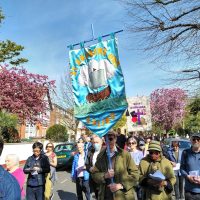https://urc.org.uk/our-news-stories/latest-news/ for a much fuller account!
General Assembly welcomed international and ecumenical guests, including Revd Géza Kacsó who serves as pastor of a Reformed community in Transcarpathia, in the west of Ukraine. He said the region has been relatively safe from bombing and missiles but that his community has lost many people who have moved away, especially young families, and men conscripted to the army. He said: “We hope for a better future and we thank you for all your support, financial and through prayer.” At Christmas, St. Andrew’s made a contribution to the Commitment for Life Appeal for the church in Transcarpathia, in memory of David Knowles.
We heard inspiring presentations of seven successful community projects from around the country, where United Reformed churches offer hot meals, or support for those caring for people living with dementia.
Assembly heard a presentation on the new Place for Hope mediation team, put in place to enable churches to deal better with conflicts between individuals and groups, and to “live well” with differences.
Important decisions were taken: to cease the training of new ministers (known as ‘formation training’) at one of the two English training colleges, Northern College (Manchester) or Westminster College (Cambridge). This is partly because of expense, but also to give the small number of ordinands a stronger and more cohesive sense of belonging to a ‘cohort’.
No further steps will now be taken to set up a new strand of ministry, for children and youth work, as no-one could see how this could fit into the wider structure of ministry for the church.
It was agreed that, at least for the time being, no change will be made to the policy of there being a normal retirement age for Stipendiary Ministers.
Assembly agreed the process to create 13 new pioneering posts, designed to “intentionally grow new Christian communities”. Assembly was told that there is an” intention to take risks” and to draw more lay workers to ministry. These take the place of posts known as Special Category Ministry.
General Assembly agreed to reduce the representation of Synods from 16 individuals (including 2 youth representatives) per synod to 12, from the session next July, as a cost saving measure. There are 13 Synods in the URC.
Assembly was given an update on the Church Life Review and four of the major pieces of work that are underway. These consist of financial resource sharing (Thames North Synod is one of the better off synods), the provision of shared support services, the employment of lay workers and the creation of new URC communities of worship and discipleship. The report sets the scene for the extraordinary session of General Assembly in November, when decisions will be taken on all the proposals.
General Assembly passed an emergency resolution on the Israeli government’s actions in Gaza, following the lead of the World Council of Churches. The Resolution commended the WCC statement, which calls for an end to “apartheid, occupation, and impunity in Palestine and Israel” and affirms the URC’s commitment to justice, peace, equity, and a diplomatic resolution to the conflict in the Middle East.
Marking five years in office as General Secretary, and looking forward to the extraordinary General Assembly in November, Revd Dr John Bradbury spoke of the Council of Nicaea, and its theological legacy. He issued a plea: it is time, once again, to believe deeply and radically in the living God made known in Jesus Christ. John related the Council of Nicaea, convened by the Roman Emperor Constantine 1700 years ago, to the United Reformed Church today. His reflections are available to read on the St. Andrew’s website, under News.
Peter Knowles





